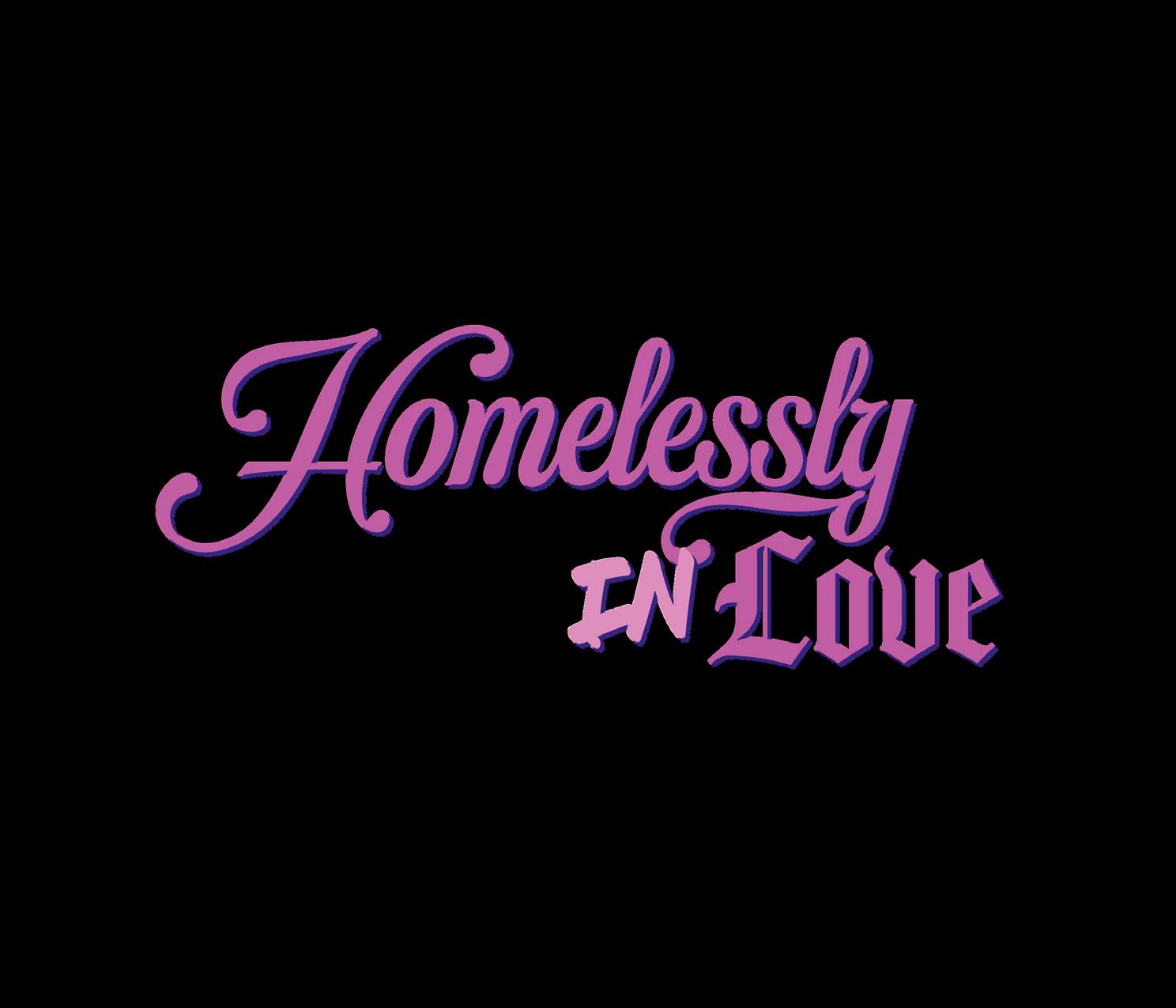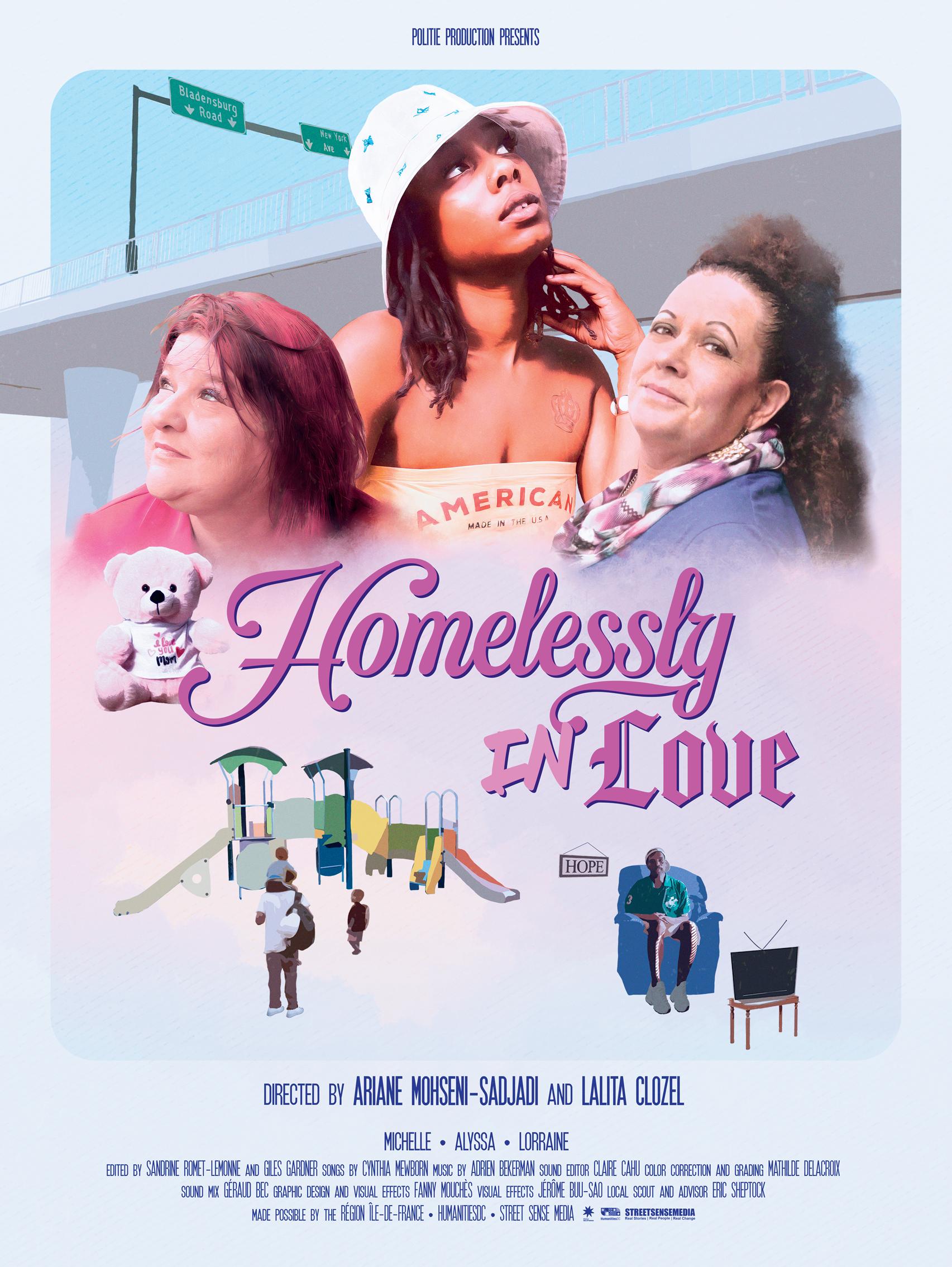






Each vendor functions as an independent contractor for Street Sense Media, managing their own business to earn an income and increase stability in their life.
NO CASH? NO PROBLEM.
directly to your vendor, empowering them to overcome homelessness and poverty
As self-employed contractors, our vendors follow a code of conduct.

1. I will support Street Sense Media’s mission statement and in so doing will work to support the Street Sense Media community and uphold its values of honesty, respect, support, and opportunity.
2. I will treat all others, including customers, staff, volunteers, and fellow vendors, respectfully at all times. I will refrain from threatening others, pressuring customers into making donations, or engaging in behavior that condones racism, sexism, classism, or other prejudices.
3. I understand that I am not an employee of Street Sense Media but an independent contractor.
4. While distributing the Street Sense newspaper, I will not ask for more than $2 per issue or solicit donations by any other means.
5. I will only purchase the newspaper from Street Sense Media staff and volunteers and will not distribute newspapers to other vendors.
6. “I will not distribute copies of “Street Sense” on metro trains and buses or on private property.”
7. I will abide by the Street Sense Media Vendor Territory Policy at all times and will resolve any related disputes with other vendors in a professional manner.
8. I will not sell additional goods or products while distributing “Street Sense.”
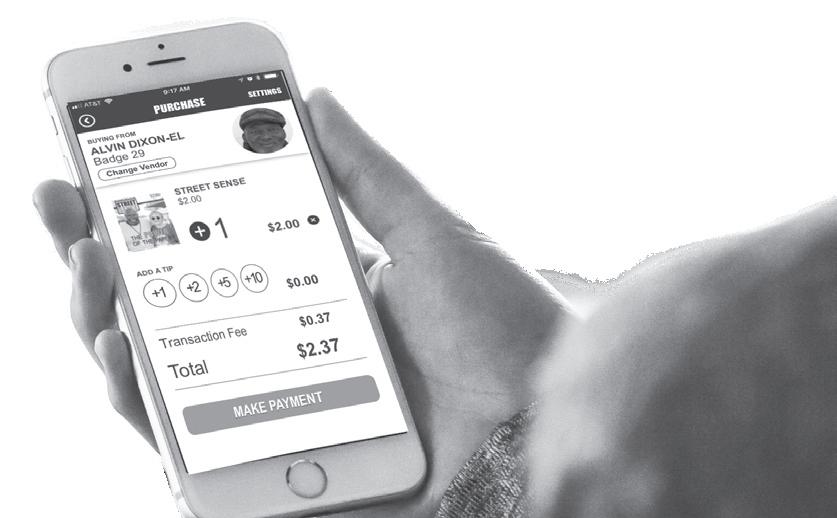
9. I will not distribute “Street Sense” under the influence of drugs or alcohol.
10. I understand that my badge and vest are property of Street Sense Media and will not deface them. I will present my badge when purchasing “Street Sense” and will always display my badge when distributing “Street Sense.”
INTERESTED IN BEING A VENDOR? New vendor training: every Tuesday and Thursday // 2 p.m. // 1317 G St., NW
Originally founded as a street newspaper in 2003, Street Sense Media has evolved into a multimedia center using a range of creative platforms to spotlight solutions to homelessness and empower people in need. The men and women who work with us do much more than sell this paper: They use film, photography, theatre, illustration, and more to share their stories with our community.

Our media channels elevate voices, our newspaper vendor and digital marketing programs provide economic independence. And our in-house case-management services move people forward along the path toward permanent supportive housing.
At Street Sense Media, we define ourselves through our work, talents, and character, not through our housing situation.
1317 G Street NW, Washington, DC 20005 (202) 347 - 2006 streetsensemedia.org
info@streetsensemedia.org
VENDORS
Abel Putu, Aida Peery, Akindele Akerejah, Amia Walker, Amina Washington, Andre Brinson, Andrew Anderson, Angie Whitehurst, Anthony Carney, Archie Thomas, August Mallory, Beverly Sutton, Brianna Butler, Carlos Carolina, Carlton Johnson, Carol Motley, Charles Armstrong, Chon Gotti, Chris Cole, Chon Gotti, Conrad Cheek, Corey Sanders, Daniel Ball, David Snyder, Debora Brantley, Degnon (Gigi) Dovonou, Don Gardner, Dominique Anthony, Donté Turner, Doris Robinson, Earl Parker, Eric ThompsonBey, Erica Downing, Evelyn Nnam, Floyd Carter, Franklin Sterling, Frederic John, Freedom, Gerald Anderson, Greta Christian, John Alley, Henry Johnson, Ivory Wilson, Jacqueline “Jackie” Turner, Jacquelyn Portee, James Davis, Jeanette Richardson, Jeff Taylor, Jeffery McNeil, Jeffrey Carter, Jemel Fleming, Jenkins Daltton, Jennifer McLaughlin, Jermale McKnight, Jet Flegette, Jewel Lewis, John Alley, John Littlejohn, Josie Brown, Juliene Kengnie, Katrina Anige, Kenneth Middleton, Khadijah Chapman, Kym Parker, L. Morrow, Laura Smith, Lawrence Autry, Levester Green, Mango Redbook, Marcus McCall, Mark Jones, Marc Grier, Mars, Martin Walker, Mary Sellman, Maurice Spears, Melody Byrd, Michael Craig, Michael Warner, Michele Modica, Michele Rochon, Morgan Jones, Nikila Smith, Patricia Donaldson, Patty Smith, Phillip Black, Queenie Featherstone, Rashawn Bowser, Reggie Jones, Reginald Black, Reginald C. Denny, Ricardo Meriedy, Rita Sauls, Robert Warren, Rochelle Walker, Ron Dudley, Ronald Smoot, Sasha Williams, Shuhratjon Ahmadjonov, Susan Westmoreland, Susan Wilshusen, Sybil Taylor, Vennie Hill, Warren Stevens, Wendell Williams, William Mack
BOARD OF DIRECTORS
Mary Coller Albert, Blake Androff, Nana-Sentuo Bonsu, Jonquilyn Hill, Stanley Keeve, Clare Krupin, Ashley McMaster, Matt Perra, Michael Phillips, Daniel Webber, Shari Wilson, Corrine Yu
CHIEF EXECUTIVE OFFICER
Brian Carome
DIRECTOR OF DEVELOPMENT AND COMMUNICATIONS
Doris Warrell
DIRECTOR OF PROGRAMS
Darick Brown
DIRECTOR OF VENDOR EMPLOYMENT
Thomas Ratliff
VENDOR PROGRAM ASSOCIATES
Aida Peery, Clifford Samuels, Chon Gotti
VENDOR PROGRAM VOLUNTEERS
Roberta Haber, Ann Herzog, Madeleine McCollough, Dylan Onderdonksnow, Amelia Stemple, Tyler Bruno
MANAGER OF ARTISTIC WORKSHOPS
Maria Lares
EDITOR-IN-CHIEF
Will Schick
DEPUTY EDITOR
Kaela Roeder
PRODUCTION EDITOR
Athiyah Azeem
STAFF REPORTER
Annemarie Cuccia
EDITORIAL INTERN
Alexia Partouche
ARTISTS-IN-RESIDENCE
Ariane Mohseni (Film), Bonnie Naradzay (Poetry), David Serota (Illustration), Lalita Clozel (Film), Willie Schatz (Writing), Leslie Jacobson (Theater), Roy Barber (Theater)
ARTS EDITOR (VOLUNTEER)
Austine Model
OPINION EDITOR (VOLUNTEER)
Candace Montague
EDITORIAL VOLUNTEERS
Josh Axelrod, Ryan Bacic, Lilah Burke, Chelsea Ciruzzo, Lenika Cruz, Alison Henry, Kathryn Owens, Andrew Siddons
 KJ Big Issue Australia
KJ Big Issue Australia
If you had the chance to talk to your younger self, would you jump at the opportunity? And what advice would you give them? Hindsight gives us the ability to look back on our younger selves with insight and compassion. Here, KJ sends a message back to her 13-year-old self.
Hi there! This is your 65-year-old self talking to you. If you don’t want problems later on in your life, please listen to what I have to say.
Firstly, on Saturday you’re going to wind up in a kids’ home, where you’ll spend both Christmas and your 14th birthday, which consists of two fish fingers, a blob of potato and an Akta-Vite drink for dinner. You’re promised to be going away for Easter but will be let down. That’s the downside. But there’s an upside: you’ll get to meet Olivia Newton-John when she visits.
From the kids’ home they’ll take you to Geelong, where for some unknown reason the other kids will take a disliking to you! It will send you into a spin. You’ll get called names because you love to study — but stick with it. Some really nice couple with a baby will take you away for the weekend. You’ll have an awesome time fishing, shooting and doing fun things. It just won’t last as long as you’d like.
Your father will visit and say some terrible thing to you that will make you not want to live. But look out for the caring matron. She will find you and take you to Melbourne, where you’ll stay at the Windsor Hotel. You’ll have to go to court to testify against him. You won’t know the outcome until your father visits your siblings at the home again and tells you more horrible things. But the matron orders him to go away and leave you alone.
You’ll get sent back to Melbourne to a Salvation Army kids’ home in Kew. There you’ll get a chance to finish school, and you also become a soldier in the Salvos.
Unfortunately, some people get into your head about your sexuality. You challenge them as you seek answers, but what you get back doesn’t help you. You are so confused. You decide to go to Sydney and get gender-affirmation surgery. You’ll be told you need to see a shrink for three years.
Instead, you’ll join the army — and love it! But, you being you, you’ll take advice from other people and leave, instead of trusting your gut. Believe in yourself. Stick it out. Stay in the army, you’ll be set for life. Please don’t take everything people say as gospel. You have so much love and kindness in you. People seem to take advantage of this, but you are slowly turning the corner. You will get there. Know that you are loved! Even though you weren’t told it. Stop trying to fix everybody else. Start with yourself.
Things do get better, I promise. Your journey is just starting. Open yourself up, let people back in. Break down the wall that you have built.
As I have said before, life does get better. You just hang in there, kiddo. I know — I’m you now!
KJ sells The Big Issue at Young & Jackson on the corner of Flinders and Swanston Streets, Melbourne, Australia.
Courtesy of The Big Issue Australia / International Network of Street Papers
• There will be a private screening of “Homelessly In Love” at the Street Sense Media offices on Friday, May 26, at 1 p.m. This will be for vendors and staff only and will be followed by the May vendor meeting at 2 p.m. Come for the movie, pizza, drinks and fellowship!
• The Street Sense Media offices will be closed Monday, May 29, for Memorial Day.
• Receive extra newspapers for referring someone you know to new vendor orientation. Every Tuesday and Thursday at 2 p.m.

• Street Sense Media is going to the Washington Nationals game on Friday, June 16th, at 7 p.m. See Thomas if you want to go!
• Vendors continue to receive free papers for proof of vaccination.
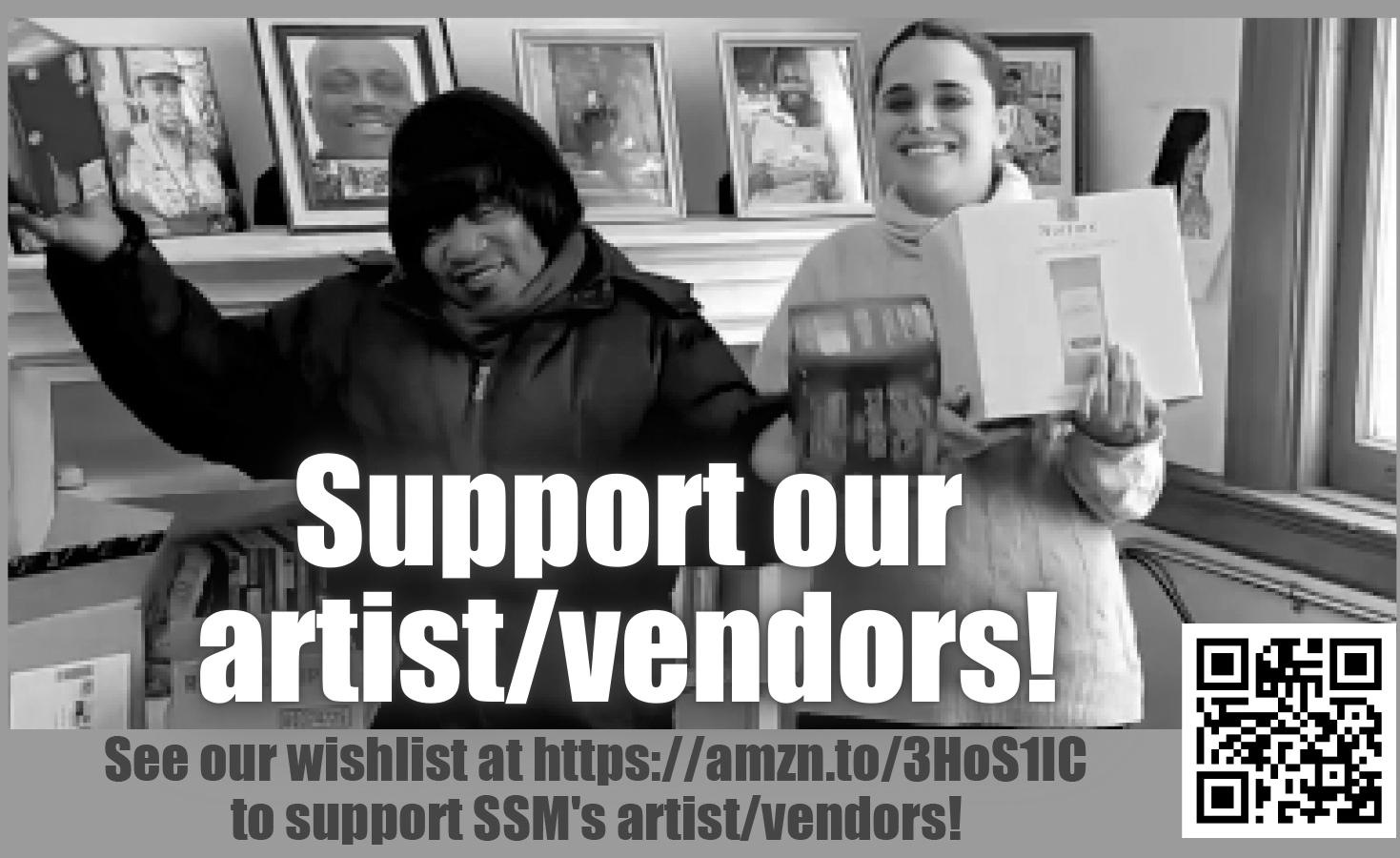
disadvantaged families who go to school and are unmarried. A bigger lump sum awaits those girls who are still unmarried at the age of 18 and are either studying or working. Thus far, money has been distributed to 7.8 million girls. The aim of giving conditional money is the attainment of specific goals, but often the conditions are also used to guarantee political support for the projects.
Direct financial aid sounds both radical and yet so logical. And for anyone who grew up in a welfare state, it seems completely normal to receive student financial aid, unemployment benefits and parental allowance without anyone monitoring how these funds are used. So, is this idea ground-breaking or ancient? Both, says Liz Fouksman, assistant professor at King’s College London.
In welfare states in the Global North, money has been paid directly to recipients for a long time, but in the Global South, the phenomenon is more recent — particularly in the world of development cooperation funds. At the beginning, after the countries had gained independence, they focused on modernization and major projects such as dams and power plants. When the projects were criticized for being corrupt and mainly benefitting Northern countries, a turn towards smaller projects began, with a focus on the development of government and on supporting civil society. These, in turn, were criticized for short-termism and the appropriation of state functions. Wells were built, but the wells were not maintained after the projects ended.
Editor’s Note: This article uses the terms “Global North” and “Global South” to divide countries into those who are higher-income (North) and lower-income (South). These terms are outdated. We encourage you to consider the article’s viewpoint about higher-income countries redistributing wealth to lower-income countries, no matter where these countries are located.
e could not believe that someone could just give us money! The kinds of amounts that our grandparents or grandfathers could not even dream of or ask for. Our relatives told us that it was true — that there are no strings attached,” says a seemingly old man, his voice rich with enthusiasm. A white-haired woman is sitting by his side. There are palm trees in the backdrop. “The money is given with love. Advice is given on how to use the money, but you can decide yourself if you take that advice or not.”
The couple are Rwandan farmers named Uwamariya and Iyamuremye, and a video of them was filmed for the website of the GiveDirectly aid organization. There is a project underway in the couple’s village, through which money is distributed directly to the inhabitants without any conditions.
GiveDirectly is perhaps the best-known aid organization that, as its name suggests, gives money to people in poverty. According to the organization, it has handed out more than $550 million since 2009. The money has been paid to over 1.25 million families living in poverty in countries including Kenya, Rwanda, Liberia, Malawi, the United States and Yemen. The organization collects funds from private donors and companies operating in wealthier countries, and it also
works in collaboration with researchers to find out how giving money directly affects people’s lives and how people use the money. Among these researchers are renowned universities and world-famous public figures, such as Nobel laureate Abhijit Bannerjee.
At the center of all this is the idea that people living in poverty know best what to do with their money and how to improve their lives.
The amount of money given directly as aid has increased immensely over the last couple of decades. A decade ago, a British development cooperation institution estimated that, on a global level, as many as one billion people receive money directly from various institutions and organizations. According to the World Bank, this number rose to 1.3 billion during the COVID-19 pandemic.
The practice of giving direct financial aid has increased in the Global South in recent years, and this is not limited to projects implemented by individual aid organizations. Money is being distributed on every continent. In Namibia and Brazil, for example, state programs covering large swathes of the population have been developed. On the World Bank’s website, there are 672 projects listed that mention cash transfers. UNICEF has implemented or researched projects related to direct money transfers in dozens of countries; for example, during 2022, it planned to distribute money to 160,000 households in Afghanistan.
Some of the money is unconditional, such as child allowance payments in South Africa. Others come with conditions attached: in Brazil, for example, children are required to go to school. The government of West Bengal state in India pays money annually to all 13 to 18-year-old daughters of
“A new turn of events began in the late 1980s, when there was an interest in engaging the local people and taking their needs into account,” Fouksman explained. “This was criticized by [people] saying that it is great in itself, but whose voice do we hear when we listen to the local people? Who decides what the locals need?” And then in the 1990s came the hype around microloans. “We now have clear evidence that they do not work,” Fouksman continued. “Generally, they do not lift people out of poverty.”
The shift towards distributing cash took place in the 2000s. “It grew partially from the participatory tradition and the idea of trust,” Fouksman clarified. “We trust that people are able to decide what to do with it.”
This enthusiasm was increased by a shift in the methodologies of empirical studies. Researchers no longer trusted theoretical, mathematical modeling of the economy; instead, they wanted to test what really works. Money transfer projects were ideal for this because they were easy to track, and their outcomes were easy to measure.
At around the same time as enthusiasm for the distribution of money in the South began, a new interest in universal income projects also started growing in the Global North — possibly also as a result of the new projects in the South.
“Even though money had been given to citizens for a long time in many wealthier countries, this practice was restricted — at least in the United Kingdom and the United States — from the 1980s onwards,” Fouksman said. “The idea that people must make do primarily through work and the support of their family became dominant. State aid was a last resort, and it was stigmatized. Those that were dependent on benefits were described as lazy.
“Compared to that, the revival of the discussion around universal income has been radical,” Fouksman continued. “In addition, when many people received a stimulus check in the post during the COVID-19 pandemic, it seemed really radical, because there are generally many — often very humiliating — conditions related to benefits.”
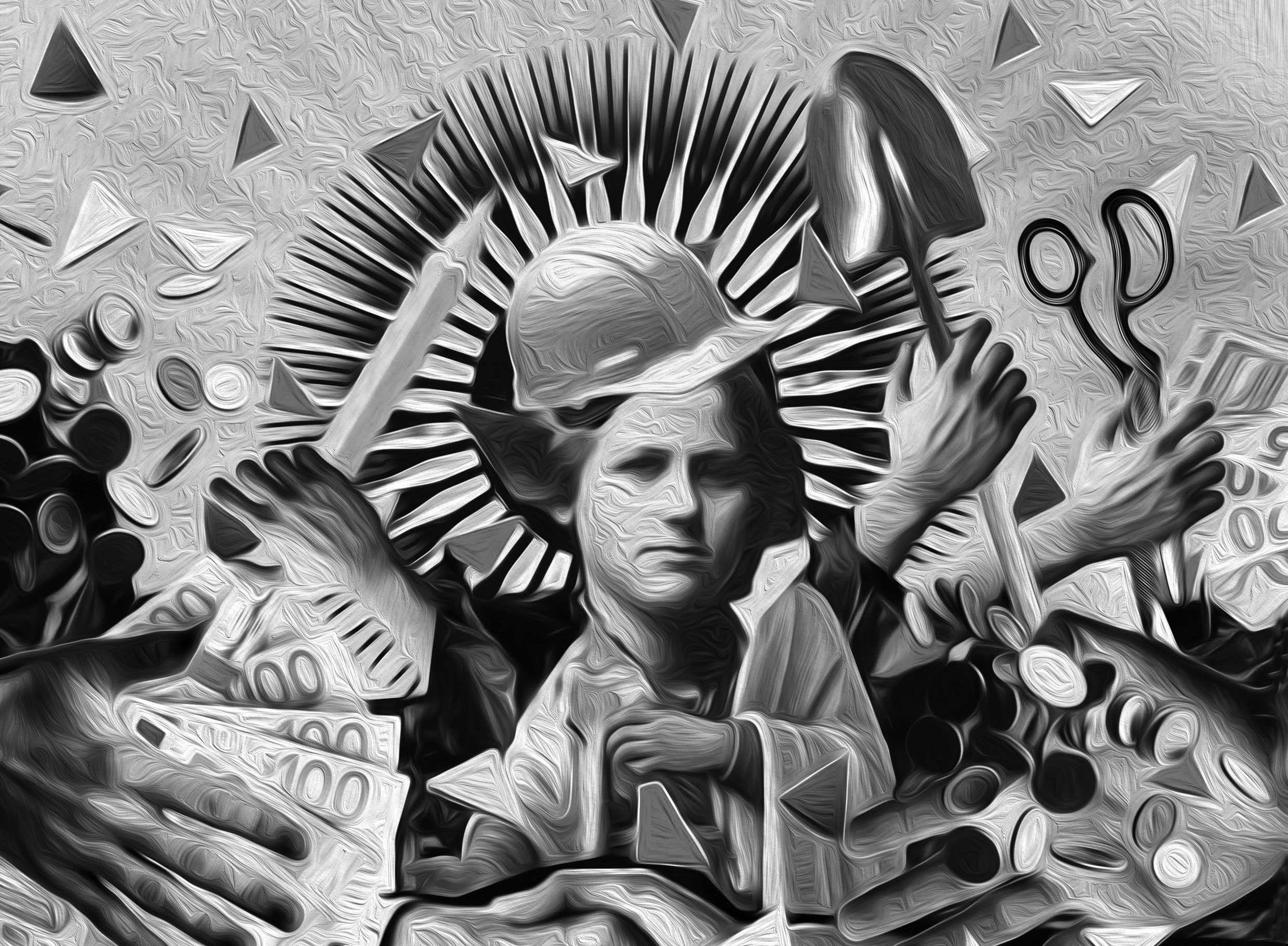
The provision of direct money does work. According to studies commissioned by GiveDirectly, people use the money on, for example, medicine, cows, goats and chickens, school fees, water, solar lights, tin roofs and motorcycles for providing taxi services, as well setting up businesses.
“The distribution of the universal income type of money has been researched since the 1970s in various kinds of trials, and, interestingly, the conclusions are consistent: in general, people do not use the money they receive on things that we consider ‘bad’, such as drugs or alcohol,” Fouksman said. “Instead, the money is spent firstly on food, and then people invest in, say, a new roof or a small business, such as chicken or taxis. Some invest their money in education or use it to move to regions where there is work.
“Profitable operations increase, as does the probability that people find work,” Fouksman stated. “When there is more money, it in turn increases demand. A positive cycle is born.”
There is also an increase in rates of school attendance, as families can afford school books and school lunches. Crime also decreases and health improves.
Let’s stop here for a moment. It is unsurprising that people living in poverty do better once they receive financial support compared with not getting support. But does direct money also work better than other types of aid projects, such as education or health projects?
In recent years, people have started to talk about the need to evaluate development projects systematically based on whether a project achieves more than the distribution of money directly to people. This kind of comparison was made in the Gikuriro program for decreasing malnutrition in children in Rwanda, but no clear winner — in terms of wider outcomes — was found.
During the Gikuriro program, groups within the community were set up for saving and lending money, parents were educated on nutrition and farming and wells were drilled. The program, which cost approximately $140 per participant, boosted families’ savings, but it did not improve nutrition, wealth, children’s physical development or cure anemia within one year. On the other hand, distributing $570 directly to the families improved nutrition, decreased child mortality and also slightly improved the physical development of children. In their conclusions, the researchers who evaluated the project chose their words carefully; however, they estimated that as a result of the significant outcomes achieved, it could be worthwhile for financers to support the distribution of these kinds of larger sums of money to a smaller group. “If we want to argue that the program should use its resources for different things [than people themselves would], we should be able to justify why people themselves are wrong,” the researchers wrote.
Direct cash is obviously not the solution to every problem. If the cash amount is small, like the amounts distributed in South Africa, it is not enough to lift people out of poverty. Temporary schemes do not necessarily have a long-term impact on those receiving the cash.
Cash transfers do not improve weak schools, social services or healthcare either, writes Heath Henderson, associate professor of economics at Drake University. And they do not solve structural problems causing poverty, such as discrimination, weak governance or unfair structures within international trade.
Distributing cash may also bring new problems. Studies have shown that directing the free cash involves difficulties that can create disagreements within communities. Although the aim has been to support the poorest, Henderson cites a project where financial support has also been received by well-to-do families, due to the aid being distributed based on the average wealth of the villages targeted. At the same time, the poorest families in nearby areas have missed out.
“There is also the fear that especially large wealth transfer projects in the Global North could create inflation on products the poor use a lot, like on rents of housing targeted at the poor. However, there is so far very little empirical knowledge of
this,” said Fouksman.
The local context is always different. Although in various studies from the Global South, distributing free cash did not lead to price rises locally, in very poor villages in the countryside of the Philippines, giving money directly to the poorest raised the price of perishable foods in a way that significantly reduced the nourishment levels of children left without aid.
What conclusions, if any, can be drawn from this for traditional aid and development programs? Or for operations like the Big Issue, where earning possibilities are created for those who need them? Should aid programs be scrapped and the money used to produce the street magazine instead be given directly to the vendors or to some of the vendors? Who would the money be given to, and what would happen to the rest?
If we take this thinking a step further, begging is in its own way a school book example of the direct distribution of cash – and it does not even involve administrative expenses, unlike direct aid programs. Should street papers shut down production of their magazines and trust that people will receive money directly from passersby? Would that work?
“I wonder if there have been any studies done on whether people are more likely to buy a magazine than to give money to someone on a street,” Fouksman pondered. “I would think this [the preference for buying a magazine] is so, since the idea of begging being morally wrong has been embedded so deep into our culture.
“I also wonder whether purchasing a magazine makes the situation less distressing to the buyer,” Fouksman continues. “When faced with a poor person asking for money, those who are not poor — speaking for myself — can feel really uncomfortable, because it reminds us of how unjust the world is. Whereas if a person is selling a magazine, you can uphold the illusion that they are just doing a job. This way the situation is surely more pleasant for everyone involved.”
An equally significant issue is the way the receiver of the money feels about the way the money comes to them. In several interviews, the Big Issue vendors have spoken about the pride they feel when selling the magazine. Many have also said that they find begging the most humiliating way to earn money.
They are not alone: money received without working for it raises suspicion around the world. When Fouksman interviewed long-term unemployed people in South Africa, she asked them for their thoughts about social security support being paid to unemployed or low-income groups. “Many of those I interviewed were very sceptical about social security payments,” she says. “They said people would become lazy or they would misuse the money. Many said that a person must work in order to get money.”
When I ask why this way of thinking is so universal, Fouksman responds by stating that she sees capitalism as an underlying factor. “At first, it may have been linked to the Protestant work ethic; now it is linked to the capitalistic work ethic,” she says.
Begging was criminalised between the centuries in Western Europe, and this legislation eventually spread across the world through colonization. “Both puritan Christianity as well as the early workers’ movement shared the idea that work refines, while laziness is despicable,” says Matti Eräsaari, a researcher in anthropology. “We have a very strong perception that a person must work.”
In addition to capitalism and global disapproval of vagrants, Eräsaari points to anthropologist Marcel Mauss’s theory of gift as the basis for the appreciation of work. “The idea behind gift-giving is that a gift must be given in return,” he explains. “By working, a person is doing something for their money and is taking part in mutual exchange rather than receiving handouts. In many situations this is important for keeping one’s dignity and self-appreciation. Charity easily leaves the recipient indebted.”
The way in which free money is talked about can strongly
impact how people think about it.
Fouksman noticed this during her research interviews in South Africa. Do we say that the transfer of funds is support for people in difficult circumstances or do we say that it is the sharing of mutual wealth that everyone has a right to?
She uses Alaska as an example, where dividends funded by oil revenues have been paid to all state residents since 1982. Last year the yearly payment was $1,114.
“When I suggested in South Africa that revenue from mining could be shared between the population as monthly direct transfers, people said yes, of course,” Fouksman says. “They could use that money for anything because it wasn’t charity, it was their money.”
Fouksman feels that such transfers of funds to the Global South from the North, such as development cooperation, should be framed as reimbursements — for example, as reparations for colonialism or slavery — as a dividend of the world’s wealth.
The idea of reimbursement has also recently surfaced in the United States. Activists and researchers there have suggested that reparations should be paid to Black citizens as compensation for slavery as well as for racially discriminatory laws and traditions that have been in place for decades, such as segregation in the southern states, mortgage denial and the overall discriminatory treatment meted out in other areas of life.
Economist Richard America describes slavery and segregation in terms of money being stolen from Black people and the white population getting rich at their expense. Compensation would be for suffering, but also an act of returning money stolen from Black families.
Attitudes towards this idea have been extremely reserved for decades. Finally, last year, President Joe Biden promised to establish a committee to look into reparations. However, this has not happened. In contrast, at a grassroots level, money has been moving. In the summer of 2020, in the middle of the pandemic and two days after the murder of George Floyd, Vermont state resident Moirha Smith sat on her sofa, angry, and decided to act. She felt that the demonstrations were not enough.
Smith is Black and has familiarized herself with the debate surrounding reparations, which governments have paid to victims of injustices. “I texted people I knew. I asked if it would be ok to create a list for reparations. Could I add their details on to it?” Moirha Smith explained in an interview on National Public Radio. “They asked, what? Do you think this will work? I said I don’t know. We’ll have to try and see. And they said, ok.”
With her friend Jas Wheeler, Smith gathered a short list of Black Vermont residents they knew, along with their bank account details so that people could send money directly to them. Wheeler’s wife Lucy, who is white, wrote a public letter to white people. The message was shared on social media.
In the letter Lucy wrote that sending just $50 would be ok, as the idea was just to seriously redistribute money. The amount would be suitable when giving it would feel uncomfortable and would have an impact on the economic stability of the giver.
To the surprise of Smith and Wheeler, the idea worked. Hundreds of Black people from Vermont joined the list and white people completely unknown to them paid approximately $65,000 into their accounts. Smith was able to pay a deposit on a car, Wheeler bought blinds, socks, underwear and big order from the grocery store. It’s little compensation for generations of slavery and discrimination, but it’s still something.
Researcher Saana Hansen was also interviewed for this article.
Translated from Finnish via Translators without Borders
Courtesy of Iso Numero / International Network of Street Papers
Plans for massive federal funding are boosting US efforts to view broadband as a utility and ensure that people who may not have access to it are able to use a high speed service.
CAREY L. BIRON Reuters FoundationSoftware engineer Dan Shuhler spent 15 years frustrated with patchy internet service while living in apartments in Arlington, Va. — and having no recourse.
Each of those complexes contracted with just a single internet provider, leaving residents with no option for other services — a common situation, he said.
"I'd probably rather have the water go out than the internet — I can get bottled water, but trying to find another place to work isn't doable," said Shuhler, 40.
Shuhler has since bought a house, but he supports an effort
to push Arlington to copy a strategy backers say has proven successful elsewhere: publicly owned, locally controlled internet service.
"Especially now with everything online, it's basically a requirement to function in society," Shuhler added.
Supporters say a public option could create more local competition, prompt increased investment, drive down prices — and reach those without internet connections.
Such debates are happening across the country, bolstered by the COVID-19 pandemic moving key services such as health care, grocery shopping and government processes online, and now by preparations for a massive federal program to close
the digital divide.
About a fifth of the country lacks internet access, particularly in poor, rural and Native American communities, according to public records.
"Treat it like a public utility — then everyone is getting proper access to it and hopefully improving service," said Tim Dempsey, a member of the ArlFiber Collective, a volunteer group that has been pushing the issue in Arlington.
The county is conducting a study on addressing the digital divide that will include a community broadband option, with recommendations due this year.
"Robust broadband connectivity has become a driver of

ThomsonPhoto by John Schnobrich // Unsplash.com
progress in ... economic development, affordable health care, public security, transportation, education and much more," said Jim Baller of the Coalition for Local Internet Choice, an umbrella group of public and private entities.
Not making such investments "isn't just a matter of a dropped Zoom call," he said. "You're retarded in your ability to stay current in all of those areas."
Yet some worry the new federal funding efforts place too much emphasis on public initiatives — and say their worth is unproven.
"At the very least, this should be a level playing field, with those forming the best proposals receiving the grant money," said Johnny Kampis, director of telecom policy for the Taxpayers Protection Alliance, a watchdog group.
The alliance in April released a report citing "unprecedented interest" in publicly owned networks but warning that such projects have often proved wasteful, redundant and inefficient in closing the digital divide.
Community broadband networks now serve more than 20 million homes, according to the recently formed American Association for Public Broadband, a nonprofit founded by state and local officials.
"The time for public broadband has come," Gigi Sohn, the association's first executive director, said in an interview following her appointment this month.
"This is the right thing at the right time, with money flowing and people sick of not having affordable choices," said Sohn, a former nominee for commissioner on the Federal Communications Commission.
About 600 communities are served by some form of municipal network, according to the Institute for Local SelfReliance's community broadband networks initiative.
Dozens more such projects are in the pipeline, said Sean Gonsalves, communications lead for the initiative, pointing to Knoxville, Tenn.; Pharr, Texas; Waterloo, Iowa, and elsewhere.
"For decades the market has been broken. Most Americans get internet service through a monopoly cable provider, and here all these years later ... we still have this digital divide," said Gonsalves.
Some cities are creating their own internet provider, while others are simply putting in high-speed infrastructure and allowing providers to use it.
Municipal systems have tended to result in more affordable rates and some of the fastest options available, Gonsalves said, citing efforts in Chattanooga, Tenn.; Wilson, N.C.; Fairlawn, Ohio, and elsewhere.
Yet these systems have been contentious, and 16 states have restricted such a "public option," according to research group BroadbandNow, after Colorado this month rolled back its barriers.
Nonetheless, 2023 "could be the year that things begin to change," it said in an April report, fueled by the massive new federal funding available.
The government last year created a $65 billion "Internet for All" initiative aiming to build out high-speed internet infrastructure and bring down cost, with money expected to start flowing in coming months.
Regulators have been explicit that local governments should be eligible.
"We want to get the best possible networks built," said a spokesperson with the National Telecommunications and Information Administration in emailed comments.
"To do that, we've asked states to create a level playing field on which municipalities; cooperatives; and small, medium, and large companies can all compete for these funds."
Still, draft guidance requires financial letters of credit from
applicants, which could be an obstacle for local governments, said Jake Varn, a principal associate with Pew's Broadband Access Initiative.
It is "an outstanding question" as to whether a waiver or other process could be put in place, he said, given that municipal governments "don't necessarily operate on that same financial plane as a for-profit provider."
Los Angeles County is using pandemic relief money to build what could become one of the largest municipal broadband projects in the country.
The effort was motivated by residents' problems during the pandemic accessing telehealth, applying for jobs and engaging in financial transactions, said Selwyn Hollins, director of the county's internal services department.
About 400,000 county households lack home internet — a figure so large as to have generational impact, Hollins said, but one that is relatively invisible.
The new program will allow selected companies to use publicly owned roofs, towers and other infrastructure to bring free broadband to low-income households, with thousands
likely connected by the end of the year.

"In parts of the county, there's only one provider, so there's no other option for people," Hollins said. "This is a very expensive place to live, so the choice has become difficult for a lot of families."
While still new, the effort fits in with any county's responsibility to support the most vulnerable, Hollins said. "This is what we do."
Elsewhere, nonprofits are working to fill this role.
Price is also the main obstacle in Baltimore, Maryland, where 40% of homes do not have a broadband subscription, said Samantha Musgrave, director of Project Waves.
The nonprofit works to bring free broadband to tenants in apartment complexes, currently serving around 1,000 low-income households – and with a long list of interested properties.
"The internet is a utility, the same as water or electricity," Musgrave said. "And we need to be really serious about the way that we're providing access to this utility."
This article first appeared on Context, powered by the Thomson Reuters Foundation. Courtesy of the International Network of Street Papers.
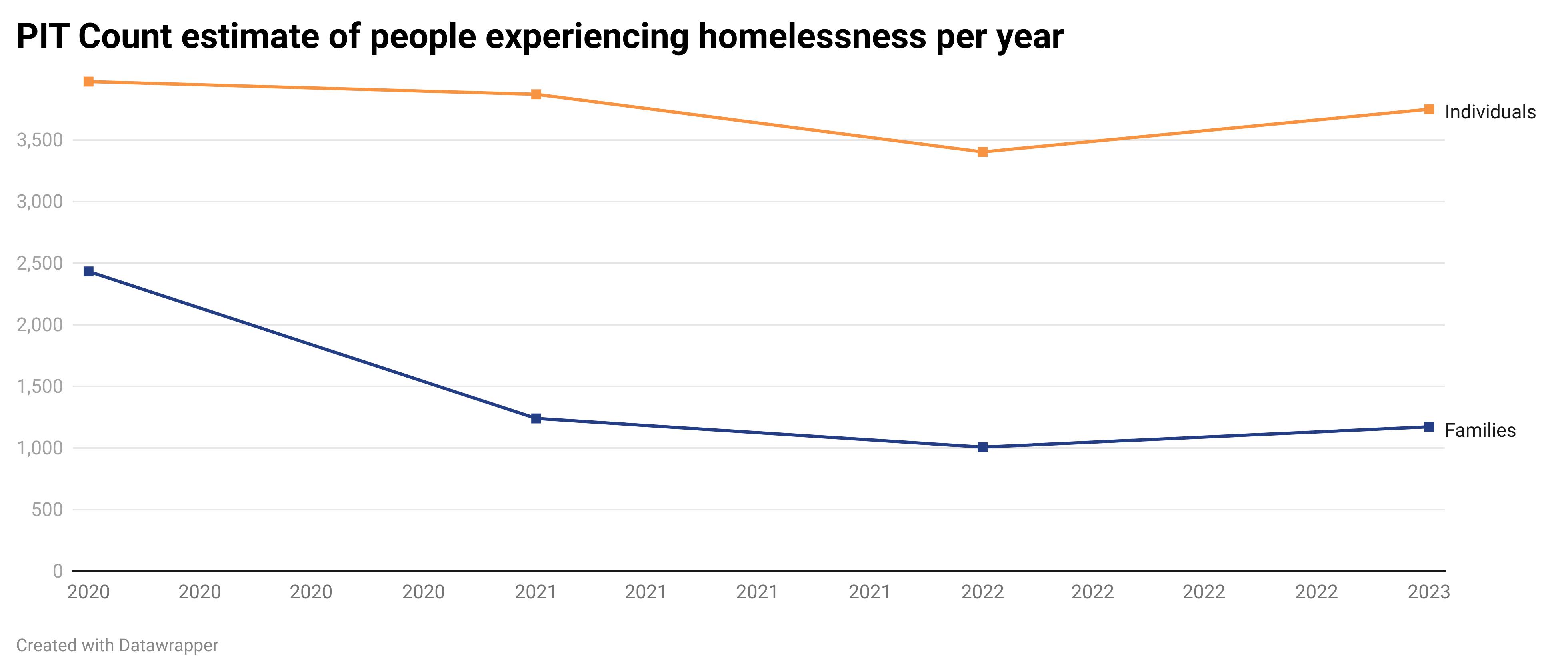 ANNEMARIE CUCCIA Staff Reporter
ANNEMARIE CUCCIA Staff Reporter
Getachew Gurumu became homeless for the first time after he received an eviction notice from his landlord during the pandemic. Then, without warning, he lost his job. Unsure what to do or where to go, Gurumu moved to McPherson Square in the summer of 2020. Three years later, the National Park Service permanently closed the encampment, forcing Gurumu and many others to find a new place to live. Gurumu is now trying to find a lawyer in hopes of getting compensation for the eviction, which occurred during the nationwide eviction moratorium.
When the pandemic began, homeless service providers across the nation worried that stories like Gurumu’s would become common and that as lost jobs butted up against unpaid rent, there would be an increase in homelessness. But the federal moratorium and an inflow of rental and unemployment benefits seemed to help prevent that, so much so that annual surveys in 2021 and 2022 found that homelessness in D.C. decreased.
Not anymore. For the first time since 2016, more people in D.C. are experiencing homelessness this year than in the prior year, according to the 2023 Point-in-Time (PIT) Count results, released in early May. This year’s PIT Count reported 389 families and 3,750 individuals were experiencing homelessness, compared with 344 families and 3,403 individuals in 2022.
The results, which homeless service providers say are disturbing but not surprising, come as the D.C. Council prepares to finalize the city’s budget for fiscal year 2024. The current budget proposal, put forward by Council Chair Phil Mendelson and approved May 16 on first reading by
the council, authorizes 230 new housing vouchers for people experiencing homelessness and maintains funds for eviction prevention, two programs legislators say are key to preventing homelessness from rising further. Mendelson’s proposal is a step in the right direction, advocates say — the mayor initially cut eviction prevention funds and included no new vouchers — but would still mean fewer resources are available than in 2023.
The PIT Count is a federally mandated annual census of the nation’s homeless population. Every January, a mix of social workers and volunteers do their best to count all of the people sleeping in shelters, transitional housing programs and outdoors on one of the coldest nights of the year. This count is meant to be used to help inform jurisdictions about the local demand for affordable housing and homeless services.
But the result is nearly always an undercount, said Amber Harding, executive director of the Washington Legal Clinic for the Homeless.
While the PIT Count receives the most attention as the official measurement of homelessness in a given jurisdiction, it is imperfect and not the only metric available in D.C. For instance, every year the District government tracks the number of people who use its homeless services system. It is generally double or triple the number seen at the PIT Count — throughout fiscal year 2022, 1,037 families and 7,834 individuals asked for help through the local homeless services system.
Since the PIT Count by definition represents a single point
in time, it’s almost certain to be less than the number of people who experience homelessness over a year. But experts say the PIT Count also misses some housing-insecure people, such as those who are couch surfing, squatting or otherwise not visibly homeless, and thus not counted by outreach workers. And since the yearly count is held in January, when the weather is cold in much of the country, people who don’t have a reliable place to sleep may use limited resources on the night of the count to stay with a friend or get a hotel room, rendering them invisible. This can especially lead to an undercount of families, Harding said. Parents often fear they will lose custody of their kids if they are found sleeping on the street, so they are more likely to couch surf or stay somewhere that is hard to find, like a laundromat, basement or abandoned building. Many families in the District also rely on Rapid Rehousing, which is essentially a form of transitional housing but is not included in the PIT Count.
Other methods of measuring homelessness also suggest the PIT Count is missing people. The D.C. Public Schools system relies on self-identification and homeless liaisons to identify students experiencing homelessness. According to its count as analyzed by Schoolhouse Connection, about three-quarters of students who said they were homeless from 2020 to 2021 were not staying at a shelter but instead staying with another family. This discrepancy suggests up to 3,760 children could have been missed in the PIT Count since it relies largely on reports from shelters to measure family homelessness. School estimates also include all families experiencing homelessness across a school year, rather than on one night.
Gaining an accurate measure of homelessness in the District
is also complicated by distinctions in the official definitions. For instance, in D.C., unhoused migrant families who arrived via buses in the last year are legally not considered homeless, though they have no place to go. In January and February, between 800 and 1,000 unhoused migrants lived in hotel rooms the local government provided them, but were not included in the PIT Count, according to presentations from the Office of Migrant Services.
This year’s PIT Count, held on Jan. 25, found 4,922 people were experiencing homelessness, 512 more people than in the 2022 count. Half of those people were experiencing homelessness for the first time, and 825 were living outside.
Of those 4,922 people, 3,750 are single individuals and the other 1,172 are experiencing homelessness with their families. Family homelessness is up from last year, but still significantly lower than in 2016. Individual homelessness, however, is higher this year than it was in 2016. Overall, D.C. saw a 12% increase in homelessness from the previous year, but a 23% decrease since 2020, the city’s most recent pre-pandemic PIT Count.
A disproportionate number of people counted in the PIT Count are Black, Asian or Indigenous, making up 88% of those counted but just 54% of D.C.’s population — a disparity attributable to structural inequities that have prevented Black people in particular from building and keeping wealth in America. Women make up about a third of the population experiencing homelessness, an increase from past years.
D.C.’s homeless population is also susceptible to health risks, the PIT Count shows. Seniors made up a third of the individual adult homeless population. Thirty-nine percent of the individuals counted were experiencing chronic homelessness, which means they have a disabling condition and have been homeless for at least a year or on three separate occasions over a few years.
D.C. is not alone in reporting more people experiencing homelessness. Across the metropolitan area, homelessness increased by 18%, or 1,339 people. While D.C. has the most people experiencing homelessness, surrounding counties saw higher increases, such as 122% in Loudoun County and 54% in Montgomery County.
In announcing D.C.’s results, the Department of Human Services emphasized the significance of the overall decrease in homelessness over the past three years. But many advocates and providers saw this year’s increase as a dire warning sign that D.C.’s progress so far on reducing homelessness is fragile. For that progress to continue, the city needs to meet the new demand, providers said.
“This kind of a jump becomes so concerning,” said Christy Respress, the CEO of Pathways to Housing. “If we’re not continuing to make those investments … then we’re just going to see these numbers rise and rise.”
Most of the people counted in 2023 were living in a shelter or a transitional housing program, such as the Pandemic Emergency Program for Medically Vulnerable Individuals (PEP-V), which is set to close by October. But the number of single adults living outside increased by 19% compared with last year, despite multiple encampment closures in 2022. Many encampment residents have told Street Sense reporters that they prefer the flexibility and autonomy of encampments to the rules
11.6%
— and sometimes poor conditions and abuse — they encounter at shelters.
Local homelessness service providers generally attribute the increase to a combination of factors — including the pandemic, evictions and rising housing costs.
88%
Of people experiencing homelessness are Black, Indigenous and Asian, even though they comprise 54% of the city’s population.
1/3
District residents facing homelessness during the pandemic had an array of helpful if patchy resources. No one could be evicted, and renters who were behind on rent could rely on programs such as STAY DC and the Emergency Rental Assistance Program (ERAP). This means D.C.’s social safety net was likely helping people stay housed, as opposed to helping them via the homeless services system, according to a report from The Community Partnership at an Interagency Council on Homelessness meeting in early May. The Community Partnership administers the PIT Count and coordinates parts of the city’s homeless services system.
Many providers characterized the increase this year as a delayed consequence of the pandemic. Eviction resources and program extensions kept many people housed through 2022, and others may have found temporary solutions, such as couch surfing — delaying their entry into the homeless services system.
“A lot of homelessness in this city is people who were barely hanging on for a long time,” Harding said. That could explain why the share of people newly experiencing homelessness increased for the first time in 2022 and 2023. In the past, people new to homelessness accounted for about 30% of the population, but in 2023, that share reached 50%. As rental assistance resources wound down, and evictions in D.C. picked up, it’s likely more people found themselves without stable housing.
The pandemic also led to increased domestic violence, a leading cause of homelessness for women and families. In 2023, 24% of the individuals surveyed and 55% of the families had experienced domestic violence, and over half said that experience had directly caused their homelessness.
Calvary Women’s Services has seen more demand over the last year, largely driven by an increase in women leaving unsafe situations, according to Kris Thompson, the group’s CEO. Calvary has added 24 new spots in its housing programs in
an effort to meet the need.
Finally, there’s the ever-rising cost of living in the District. Rents have risen over the past year even as benefits from many social safety net programs have decreased. Meanwhile, wages have frequently not kept pace, meaning more households are paying a large portion of their income to rent, an early predictor of homelessness.
“Affordable housing in this city is just, it just feels nonexistent,” Thompson said. “Rent increases have just outstripped any ability for people to keep up.”
After Mayor Muriel Bowser’s administration adopted Homeward D.C. in 2016, the District began seeing reductions in the number of families experiencing homelessness year after year. D.C. officials have attributed the drop to the influx of resources such as new shelters and housing programs. But the District only began making similar investments for individuals a few years ago, as Interagency Council on Homelessness Director Theresa Silla said at a D.C. Council oversight hearing.
The good news in this year’s PIT Count, advocates say, is that there’s a strong indication the money D.C. has put toward ending homelessness is working: The number of people who were able to exit homelessness increased by 57% last year. But the very resources advocates touted as successful so far — and necessary to prevent another rise in homelessness in 2024 — are the ones the mayor proposed cutting in this year’s budget.
“If we’re seeing an increase of over 10% in the number of people experiencing homelessness, obviously this isn’t the moment to lose more resources,” Thompson said.
The budget given initial approval on May 16 by the D.C. Council includes more spending for eviction prevention and vouchers, two of the major asks of the Way Home Campaign, which seeks to end homelessness in the District. But the proposed funding, for vouchers especially, is still below what some advocates say is needed to see a decrease in homelessness.
D.C.’s ERAP — which can pay missed rent, helping residents avoid eviction — originally faced a budget cut of over $30 million, but Council Chair Mendelson proposed to reverse the cut. While ERAP is not as expansive as the federal eviction prevention programs in place at the height of the pandemic, many D.C. residents have credited it with keeping them out of homelessness.
The program is currently set to have $43 million in fiscal year 2024. This year, that amount of money enabled the city to help residents for only five months, prompting advocates to recommend $117 million for 2024 in hopes it would last the year. Even with this year’s funding for ERAP, they note, many people became homeless for the first time through evictions.
Under Mendelson’s proposal, D.C. is set to fund just 230 new Permanent Supportive Housing (PSH) vouchers, which have been key to moving people out of homelessness, compared to over 1,000 vouchers in past years. That’s an increase from the mayor’s proposal of no new vouchers, but the Way Home Campaign is asking the council to fund about 1,700 total new vouchers before it finalizes the budget. While the city has faced challenges in implementing the existing vouchers, service providers say the program is improving and the backlog will soon ease.
Mendelson’s budget proposal also reverses many of the cuts homeless service providers spoke out against, including money for legal assistance to help tenants fight eviction cases and for domestic violence services.
The council will have to officially approve the budget on May 30 with a second vote.
This article was co-published with The DC Line.
“If we’re seeing an increase of over 10% in the number of people experiencing homelessness, obviously this isn’t the moment to lose more resources.”
~ Kris Thompson, the CEO of Calvary Women’s Services
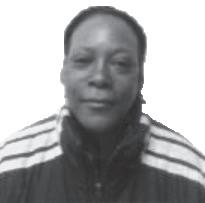
When people are reliant on shelters, I believe there are a lot of disconnects. First off, shelters are for emergencies only and should not become a home.
One of the first things you learn is the hours of operation. Some shelters close each morning and people don't have a place to stay. Many don't understand or care about anything when it is time to clock out at 6 a.m., but poverty and homeless people don't clock out. It's like I'm at work even when I can no longer stay awake. I don't get time off or a home, as you would say I should. People are working where I am currently living at. People have lost their lives there or have suffered some form of violence, whether it is verbal or physical.
Some would say I should be grateful to have a bed at the
ERICA DOWNING
Artist/Vendor
“Time flies when you’re having fun,” goes the saying.
“You’ll understand when you’re older,” grandmothers say.
“You’re too young to understand,” parents say.
“You only live once,” the motto of youth.
All excuses to continue without purpose.
All reasons to withhold knowledge.
All justifications not to share wisdom.
All ways of releasing responsibility and accountability.
shelter but I don't care. I can't wait to get off the clock. Power and control come to some who should not have it. The conditions in shelter are created by the culture of people in power. Their culture is not my life but I can't get away from the homeless or needing shelter without donations or money. Imagine having to be professional all the time. You can't sleep in your drawers in the shelter, the rules say you must be fully clothed at all times in the shelter. Do you see how difficult just this one rule is? Your clothes will go to the shower with you. You must wear your shirt and pants. You're living like you're in college, a dorm with about 50 or 60 people. You don't get any privacy in the shelter. It is a small space with a lot of people with a lot of different attitudes including staff members. You spend half the night awake trying to figure out how not to come back to the shelter only to have to return to a safe spot
to sleep. Sometimes you have to come back as early as 4 p.m. depending on the specific shelter. Then you wait in line and hope for a placement. While you wait you are often handed forms, whether it be required intake paperwork or surveys to assess how the District spends money on the resources you are using. Whatever it is, you feel like your bed depends on it. We value money too much. Not having enough money determines who you talk to and what you talk about. It takes so much effort and time that other needs come last. It's not as easy as some of us make it look. Homeless means that after you leave I'm still suffering. Recognize and remember that. It's the only way to show how it's everyone's job to end homelessness. I don't want to be homeless any more in the future, so I will pray to God.
When I went into the program I thought I had everything nailed down, but everything started hitting me back. I didn't get my unemployment and they turned me down for Social Security. I couldn't get up and when I came home my job was gone, even though they promised me it would be there. Trust me, it was very hard to pick up my confidence and start all over again.
But I believe in God and I know if He means well — He will give and I will receive. In these types of times, you feel as though all things are falling down. When you try and try and try and try again, no matter what you do, things don't come out in your favor.
When will you come to know the truth? When do you realize life is not a fantasy? When do you realize your time is dwindling? Time is the rarest commodity in the universe. Time cannot be reversed.
Time cannot be earned, only spent.
Spend time growing your mind with knowledge!
Knowledge from others and experiences creates wisdom.
Wisdom from collective decisions, experiences, and knowledge of all.
Moves you forward, not in fear or apprehension.
Instead, embracing courage and caution breeding progress.
Progress that gives birth to a life of abundance.
When will your new chapter begin?
When you choose to take the wheel.
They even rejected my state tax. Now I have nothing to depend on, plus my car broke down. I'm about to get put out of my apartment and remember, I don't have a job and no type of income. But all is well. I believe in God. He is the almighty God and with Him, anything can happen and I believe He's holding on for something big for me. But when I came home I was in a slump. I couldn't pick myself up. I started back drinking but I'm realizing I'm not the only one that goes through this stuff — everybody has hard times, bad times, bad luck, whatever you want to call it. But when you believe in God, He's going to come for you and He's going to help you put one step forward. He'll take two more steps for you. I depend on Him and I know He depends on me because without Him there is no me.
So even though you’re going through hard times and it seems like the battle will never end and you keep failing, you keep losing, just keep the faith. God is right there, He's listening to us, and He knows what we’re going through. He’s just waiting for us to do things for ourselves so He can help us. Right now, I'm back drinking so it's hard for me. But before I was drinking I was five months clean and I thought everything was going to go my way. Everything didn't go my way. Whether I was drinking or not, I still had bad behaviors and those bad thoughts. He's waiting for me to straighten up and fly right, and trust me, He's waiting for you to straighten up and fly right. Everything will be well. Until next time. I'll see you soon — take care and stay clean.
I wear my happiness on the outside, for me it’s sad to be happy when loneliness is trying to take over.
I was promised forever like my rib, but I don’t want my baby back this time, right now forever is haunting me, will I spend forever by myself?
Who came up with this word forever?
I know it was written, I wish I could see that page, would that make me feel happy or sad to know what will be, probably so.
It doesn’t take forever to mate, so how can it take forever to find a mate?
I understand forever can break you down but lately forever is building me up.
I’m telling you it’s taking forever for me to cry, my tears are close, but so far away.
Forever is kicking my ass, if it keeps up my butt will be flat.
Forever just made me laugh, maybe forever isn’t forever, it’s just a mask and it’s time to take it off, so I can sleep in peace.
What is love? There are so many songs that bring this feeling to your frontal lobe, I hope this is a beautiful poem, that will make your frontal lobe crave more.
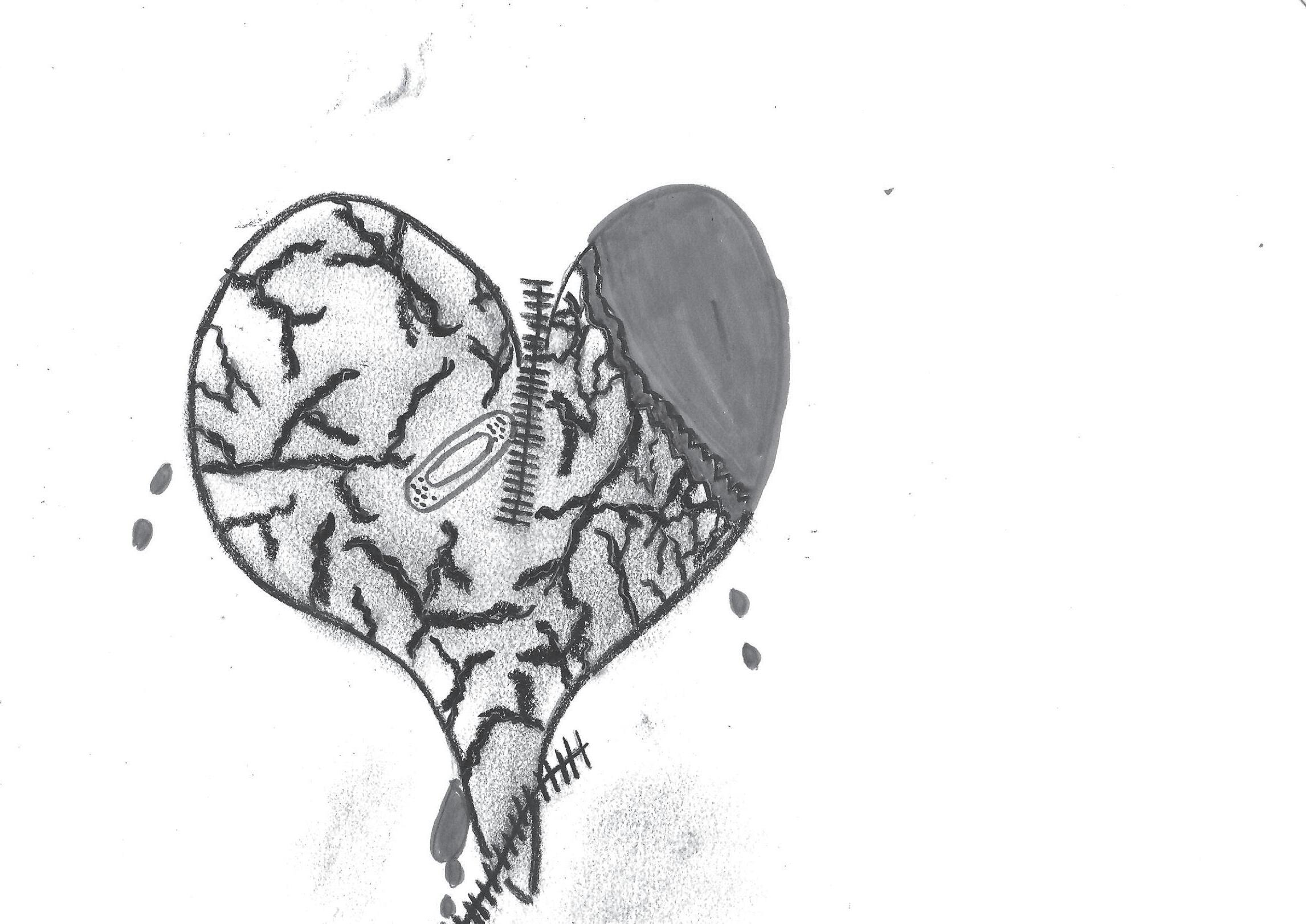
Love is a orgasm, that can be a temporary function, this feeling doesn’t get old.
Love comes in waves.
I sure do like to ride them.
I know the difference in loving and being in love.
Love brings forth a lover.
Love can be a poison, that dissolves when the heart is broken.
Love brings forth kids, and wakens the kid within.
Love can brings forth lost tears.
Love is a window that is open sometimes.
We can’t help when someone befriends and climbs in.
DOMINIQUE ANTHONY Artist/Vendor

I have been through some things in my life that have hurt and caused me a lot of pain and sorrow. In my past, there were things that happened to me that I can't forgive that hurt so badly. Two people recently hurt me. What they did hurt me so badly and it made me feel so low in trust until I reconnected with someone else from my past.
They made me feel that there are some good people in the world and the person coming into my life became a blessing. This person and I are very close. This friendship is very important to me. I’ve learned through the pain that we can get through our pains and hurt and everybody deserves to be loved and have someone special in their life. One day I would like to be with this person but if we can't be together we always are best friends. I would never stop loving this person. The way they support me is the way I support them and take care of them. Life has its ups and downs but we don't know what God has planned for our life.
He shows us the good in the crazy world. He has a good heart and is kind and loving and can be your shoulder to cry on when you are down or low. He let me know it was okay to care about someone. He made life to live like he made days on Earth and He shows that life can cause hurt and pain.
Love is pain — like Ja Rule said.
I’ve been at Street Sense for at least 10 years and my girlfriend Sybil has been here at least 11.
We both sell our Street Sense papers on 19th Street NW. We both have our Black and white customers. And my birthday is always on Oct. 25, and Sybil’s is always on Dec. 25, every year. I know Maria and Thomas and Will.
In spite of my last report featured on my Street Sense vendor profile, my student loans have been forgiven. I had hopes of returning to school someday, especially since I am constantly in a school setting around American University.
The fact remains that I'm still in a bit of fear that I'll have a repeat of the oppressing events that I experienced when I first attempted to return to school. That was back in 2006 when I was homeless down in Norfolk, Va. I was staying at the Norfolk shelter on Brooke Avenue when I first got the inclination that I could get out of that bad situation by going to school and completing my degree.
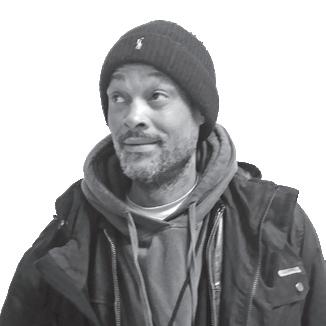

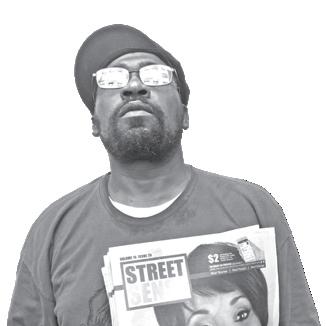
I walked past the Educational Opportunities Center almost daily. I was familiar with the organization since they were the ones who initially helped me enroll in school down at South Carolina State University. So I stepped in again, this time in a different location, to plan out and pursue my future. Shortly after setting myself up with that long-distance, futuristic touchdown bomb, I was offered a job by a guy in a car who directed me to All-Star Temp Agency. I thought sure, I could use the extra money to get through the month. The manager there was named Walter, I remember, and he sent me right out on a light construction job at a Ruby Tuesday they were building and preparing to open.
Anyway, around about the third day in, or out, I stopped for a bite of breakfast that morning before work at the gas station along the way. The attendant accused me of stealing a pack of 50-cent doughnuts, and I replied that "You couldn't have because it didn't happen." I ended up tossing my 50 cents at the window for a bag of sunflower seeds and stormed out in anger at his accusation. I got about a block away from the job when police pulled up on me and asked me to return to the gas station for something I didn't do, and I refused!
The first officer called for backup since I was being resistant
MARS
Artist/Vendor
Last, but least A samurai so Neat.
His katana stripes His enemy… Forever dead.
about a crime I didn't commit. I did offer him to take off his utility belt and fight me for the right to take me back. I was just trying to get to work that day and continue on my way. The second officer, Cooper, who must've been patrolling the parallel street in pursuit of me, arrived on the scene, parking crookedly, and immediately hopping out of the car screaming "Get on the ground!" He extended his blackjack and proceeded to strike me with his wand, breaking my forearm on the first blow, leaving me with no choice but to get down on the ground as I was cuffed.
I exclaimed, "You broke my arm!" but it made little difference as an ambulance was called and arrived half an hour later, but merely to put a band-aid on my broken skin and not to treat my broken limb! I spent that whole half hour cursing the officer as he sat there in wait playing solitaire on his cruiser's computer. My bag was never checked, being dismissed as "He probably already ate and discarded it by now." I sat for a week before I could see a doctor about a cast. I was given 30 days. I was eventually released whereupon I returned to the scene of my arrest where I discovered why my glasses were never retrieved. They had been stomped on and destroyed, scraped across the concrete.
I left for Maryland at once, where I was expecting to receive my college funding and complete my mission of enrolling in classes once again. In all of the commotion, I forgot which schools I had sent my financial aid off to, and ended up at the University of Maryland University College since they were offering waived admission fees.
I got about two months' worth of school in before I was again falsely arrested. Campus police followed me around campus, issuing citations for trespassing only to have them rescinded by the schools' administrative offices three times! I only got through that period of having no home, no glasses and a broken arm with some help from some fellow students. They took me in and accepted me at the school's radio station, and allowed
CARLTON JOHNSON
Artist/Vendor
We walk the path with no touch. We stumble over the time, nowhere to run or hide.
me to come in out of the cold and spend time with them doing something that I love! Playing music!
After a night of warmth and lodging provided by the student body, I was arrested following a janitor's inquiring "Do you belong here?" He asked a second time not being satisfied with my answer of "Yeah!" He immediately bolted out with the words, "I'm going to get the police…" Being caught up in the moment, I failed to run or find an alternate escape route due to being captivated by the brand new, Jay-Z video, "Show Me What You Got!" The arresting officer had promised to arrest me before if he ever came across me again. I reminded him, so he did. I got another 30 days for nothing. I ended up getting jumped in prison for getting a drink of water from the faucet rather than the sink in my cell as suggested. So he called in the emergency response team, AKA the "goon squad"!
After I spoke with them calmly, they began making their entry into my cell where the cowardly backstabbers of about seven to nine goons began jumping and stomping on me inside the small cell after the ringleader had maced me for no good reason at all, other than protocol and procedure! The attack continued all the way down the corridors, in the medical shower and into an awaiting cell. I just took the assault, bearing in mind that one of my younger cousins died from blunt force trauma to the temple, to the dome, and it occurred to me that these fellas were playing for keeps! I ended up in the "hole" traumatized by the fact that they did that. I was left there sore sulking over the events that had just taken place. I was in the youth housing unit and they let me know that it was a regular occurrence there as far as they knew. They comforted me, but at the same time, it troubled me even further considering I'm a man with a very loud voice as a poet and these were just defenseless children and kids. I could think my way out of the box, but what about them? They depended on their parents, and their parents weren't there for them.
DONTÉ TURNER
Artist/Vendor
Ignorance and malice
Pass me by
Poverty and hatred
Pass me by Stress and failure
Pass me by
Destruction and defeat
Pass me by
Evil and dark spirits
Pass me by Hallelujah, thank you, Lord You didn’t
Pass me by!

MELODY BYRD
Artist/Vendor
I think the frog on the lily pad is a good idea. I also think it is a nice day for an animal to be outside and the frog is very smart.
Artist/Vendor
Discrimination has to stop around the world. Changes have to come. Discrimination really hurts, and discrimination is horrible. I know because I’ve been discriminated against a lot. Sometimes when you are minding your business, people will come and pick on you. That’s when I want to be there for people. I want to lift people up.
What can we do to make it better? We need to come together from both sides. I don’t discriminate. So change needs to come from everyone involved to stop discrimination. Mayor Muriel Bowser needs to start a campaign to make that happen.
I miss my cousin Munah, who passed away. She did so many good things for people in West Africa. I also miss my cousin Ame, who died in 2018 and also was a great person.


Artist/Vendor
When you are a woman there are many parts of your life. Wife, mother, friend, caretaker.
Motherhood is a major part of a lot of women’s lives. Carry and care for them. It’s like a continuous thing. The attachment is hard to explain. When you carry a living person in your body the bond is very hard to break.
If you find that you become attached to someone who didn’t come from your body, you can still become so involved with loving them. It is hard to explain. There is no word to explain love and that is what motherhood is. Continuous love, care and emotions.
We all have mothers, or we would not be here. God or nature made it that way. You have to come from another person.
Yes they are trying to start cloning, but I don’t think that is in the same category and it’s not trustworthy.
Motherhood is special and always will be. That special bond between mother and child will always be thought of as something that truly cannot be totally explained.
LADY SASHA
Artist/Vendor
I was housing unstable when I found out about Relisha Rudd. She was a girl who went missing while she and her family were staying at the D.C. General Family Shelter.

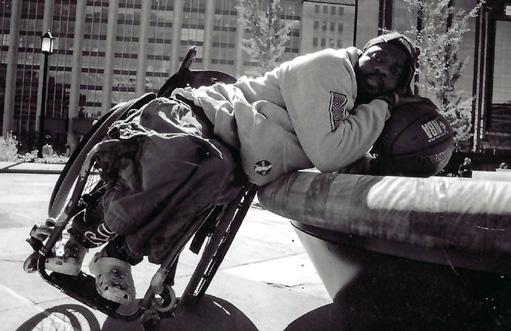
It made me think about how the youth are vulnerable. Children and teens are supposed to be protected. I remember experiences from my life that continue to haunt me and trigger me. I wish I was protected and safe growing up because it’s hard to deal with “losing control,” as I call it.
As a mom, I am bothered about how Rudd vanished the way she did. But I also want to know what is really going on to protect the youth from being kidnapped. Human trafficking is real. And being in D.C., seeing the youth here, it’s like you just never know. But I wish for a safe return home for families that are missing loved ones.
Today, there are 14 youth reported missing this year in D.C. But there are also some that return home each year.
Across
1. Pulitzer-winning Edna Ferber novel (2 wds.) (2,3)
6. Saturn vehicles? (abbr./initialism)
10. What Aleve alleviates
14. Poetry Muse (whose name, ironically, anagrams to ORATE)
15. Captain of the Nautilus
16. High school breakout
17. Word in ___-car or Oscar de la ____
18. Italian auto make that’s also a word meaning “law” or “rule”
19. Night light
20. *What determines a professional boxer’s size classification (2 wds.) (4,6)
22. Chow down, in fancyspeak
23. “How ___ Has the Banshee Cried” (Thomas Moore poem)
24. Fizzes up
26. *Chronological representation of past or planned events
31. Little amount of Brylcreem that’ll “do ya,” per its throwback ads
32. Muslim leader
33. Cordelia’s father
35. Outstanding ones can prevent outstanding credit ratings

39. Zhivago’s love
40. Spanish 101 verb (STARE anagram)
42. Sir Mix-____-____ (Seattle rapper known for “Baby Got Back” (1-3)
43. Bonus
45. “No ____ luck!”
46. Raw fury
47. Speed meas. on European hwys. (abbr./acron.)
49. *Cross-corner bank, masse or safety (2 wds.)
(4,4) (SHOP TOOL anagram)
51. You can count on it
55. Helmsman’s heading
56. Work without ___ (be daring) (2 wds.) (1,3)
57. *Stationery page containing printed information to identify and give contact details for the sender
63. ____ Field (home of the Mets)
64. Barre room bend
65. John ____ Garner (FDR’s first VP)
66. Mint
67. Computer offering
68. Madonna role
69. Blood type, briefly (2 wds.) (1,3) (incls. abbr.)
70. Phys. activity (abbr.)
71. Made over (or, as 2 wds., a Communist Party membership card)
Down
1. Certain Slav
2. Creme-filled cookie
3. Nirvana or Soundgarden
4. ___-bitty
5. Leave one’s military assignment illegally (2 wds.) (2,4) incls. initialism)
6. Condition of being unable to perform as expected and/or/ required (FINEST SUN anagram)
7. “Ghostbusters” (2016) director Paul
8. Nebraska city named for an Indian tribe - or a Texas Hold’em-style poker variation
9. Drunken
10. Black and white bamboo munchers from China (2 wds.) (5,5)
11. Kick butt on a test (2 wds.) (3,2)
12. Hole-___ (duffer’s dream) (2,3)
13. Bogotá babies or Hawaiian geese
21. Paperless tax return option
25. Wicked cool, in the 90s
26. Game piece in Scrabble or Mah Jongg
27. Huge-screen film format
28. Shopping place
29. Advertising milieu targeting on-line shoppers (1-9) (GERMAN KITE anagram)
30. Devour with gusto (2 wds.) (3,2)
34. One who is known to be a great storyteller (OUR NECTAR anagram)
36. What something that’s meh now was in the 70’s - 80’s
37. Opposite of “For here” at a fast food restaurant (2 wds.) (2,2)
38. Proofreader’s “put it back in” shorthand
41. Geneva’s river
44. Police alert, for short (abbr./acron.)
48. S.O.S., in 2 wds. (4,2)
50. Loewe’s “My Fair Lady” musical collaborator
51. Anarchist convicted with Vanzetti in a highly publicized 1921 trial
52. Word that precede or follow “labor”
53. Knot again
54. Messaging system made obsolete by faxing
58. Fork feature
59. To ____ and to hold (wedding vows phrase)
60. Oklahoma city often used in crosswords
61. Broadway opening? (2 wds.) (3,1)
62. Word that can go before heat or meat... or precede both parts of the answers to this puzzle’s four starred clues
*This crossword puzzle is the original work of Patrick “Mac”McIntyre. It is provided to us courtesy of Real Change News, a street paper based in Seattle, Wa. Learn more about Real Change News and the International Network of Street Papers at realchangenews.org and insp.ngo.
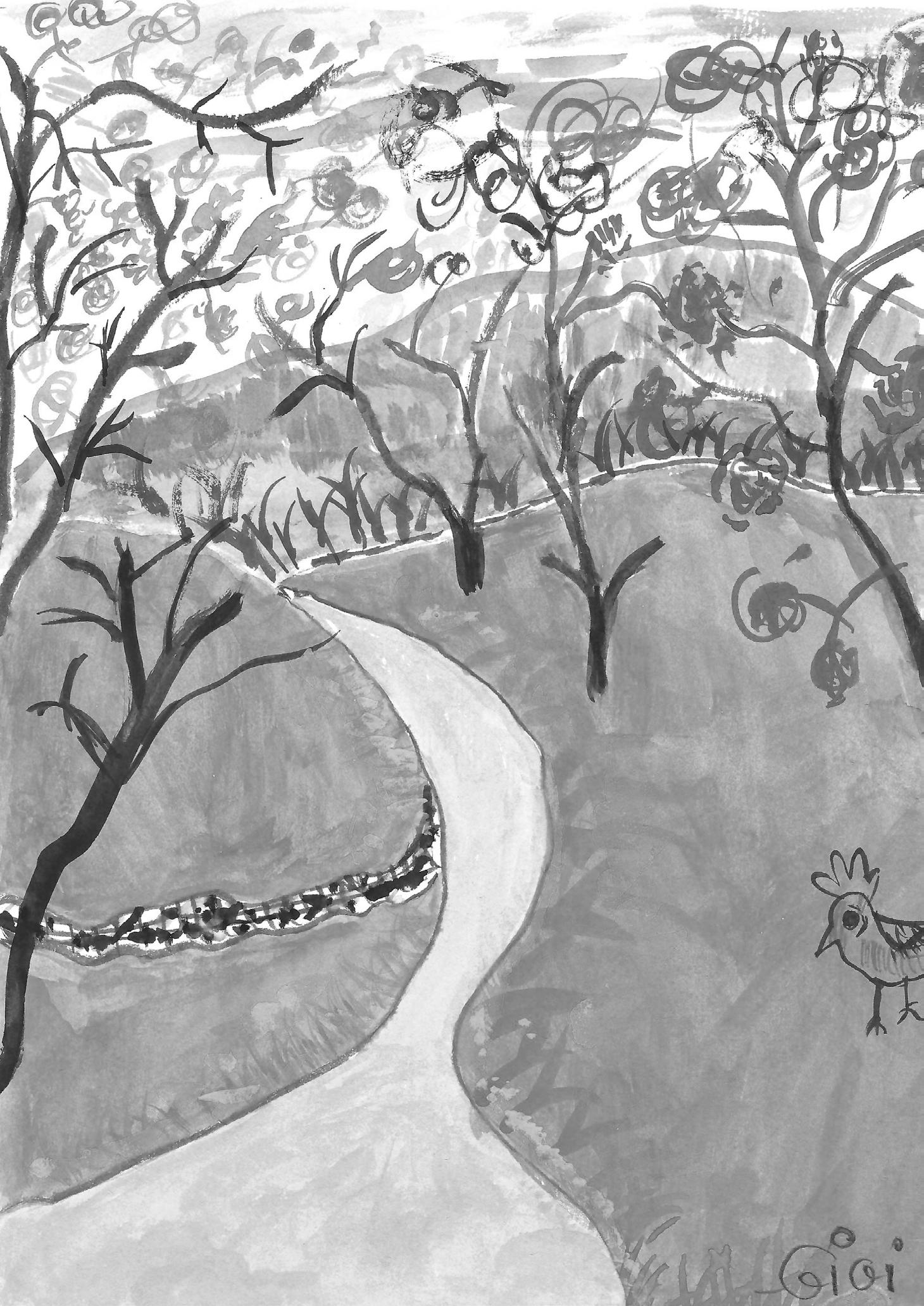
All services listed are referral-free
Academy of Hope Public Charter School 202-269-6623 // 2315 18th Place NE aohdc.org
Bread for the City - 1525 7th St., NW // 202-265-2400 - 1640 Good Hope Rd., SE // 202-561-8587 breadforthecity.org
Calvary Women’s Services // 202-678-2341 1217 Good Hope Rd., SE calvaryservices.org
Catholic Charities // 202-772-4300 catholiccharitiesdc.org/gethelp
Central Union Mission // 202-745-7118 65 Massachusetts Ave., NW missiondc.org
Charlie’s Place // 202-232-3066 1830 Connecticut Ave., NW charliesplacedc.org
Christ House // 202-328-1100 1717 Columbia Rd., NW christhouse.org
Church of the Pilgrims // 202-387-6612 2201 P St., NW food (1-1:30 on Sundays only) churchofthepilgrims.org/outreach
Community Family Life Services 202-347-0511 // 305 E St., NW cflsdc.org
Community of Hope // 202-232-7356 communityofhopedc.org
Covenant House Washington 202-610-9600 // 2001 Mississippi Ave., SE covenanthousedc.org
D.C. Coalition for the Homeless 202-347-8870 // 1234 Massachusetts Ave., NW dccfh.org
Downtown Day Services Center 202-383-8810 // 1313 New York Ave NW https://www.downtowndc.org/program/the-center/
Father McKenna Center // 202-842-1112 19 Eye St., NW fathermckennacenter.org
Food and Friends // 202-269-2277 (home delivery for those suffering from HIV, cancer, etc) 219 Riggs Rd., NE foodandfriends.org
Foundry Methodist Church // 202-332-4010 1500 16th St., NW ID (Friday 9am–12pm only) foundryumc.org/ministry-opportunities
Friendship Place // 202-364-1419 4713 Wisconsin Ave., NW friendshipplace.org
Georgetown Ministry Center // 202-338-8301 1041 Wisconsin Ave., NW georgetownministrycenter.org
Jobs Have Priority // 202-544-9128 425 2nd St., NW jobshavepriority.org
Loaves & Fishes // 202-232-0900 1525 Newton St., NW loavesandfishesdc.org
Martha’s Table // 202-328-6608 marthastable.org 2375 Elvans Road SE
2204 Martin Luther King Ave. SE
Miriam’s Kitchen // 202-452-8926 2401 Virginia Ave., NW miriamskitchen.org
My Sister’s Place // 202-529-5991 (24-hr hotline) mysistersplacedc.org
N Street Village // 202-939-2060 1333 N St., NW nstreetvillage.org
New York Avenue Shelter // 202-832-2359 1355-57 New York Ave., NE
Patricia Handy Place for Women 202-733-5378 // 810 5th St., NW
Samaritan Inns // 202-667-8831 2523 14th St., NW samaritaninns.org
Samaritan Ministry 202-722-2280 // 1516 Hamilton St., NW 202-889-7702 // 1345 U St., SE samaritanministry.org
Sasha Bruce Youthwork // 202-675-9340 741 8th St., SE sashabruce.org
So Others Might Eat (SOME) // 202-797-8806 71 O St., NW some.org
St. Luke’s Mission Center // 202-333-4949 3655 Calvert St., NW stlukesmissioncenter.org
Thrive DC // 202-737-9311 1525 Newton St., NW thrivedc.org
Unity Health Care 3020 14th St., NW // unityhealthcare.org - Healthcare for the Homeless Health Center: 202-508-0500 - Community Health Centers: 202-469-4699
1500 Galen Street SE, 1500 Galen Street SE, 1251-B Saratoga Ave NE, 1660 Columbia Road NW, 4414 Benning Road NE, 3924 Minnesota Avenue NE, 765 Kenilworth Terrace NE, 555 L Street SE, 3240 Stanton Road SE, 3020 14th Street NW, 2700 Martin Luther King Jr. Avenue SE, 1717 Columbia Road NW, 1313 New York Avenue, NW BSMT Suite, 425 2nd Street NW, 4713 Wisconsin Avenue NW, 2100 New York Avenue NE, 2100 New York Avenue NE, 1333 N Street NW, 1355 New York Avenue NE, 828 Evarts Place, NE, 810 5th Street NW
Restaurant Team Member
Shake Shack // 1216 18th St. NW
Full-time
Prep food, operate the cash register and clean the store.
REQUIRED: N/A
APPLY: tinyurl.com/shakeshack-member
Team Member
Chipotle // 1010 Vermont Ave. NW
Full-time / Part-time
Take orders, prepare meals and ingredients and clean the store.
REQUIRED: N/A
APPLY: tinyurl.com/chipotle-vermont
Housekeeper
Marriott Residence Inn // 1199 Vermont Avenue NW
Full-time
Change bed linens and make beds, dust furniture, sweep and mop floors and clean public areas.
REQUIRED: N/A
APPLY: tinyurl.com/downtownmarriotthousekeeper
Washington Legal Clinic for the Homeless 1200 U St., NW // 202-328-5500 legalclinic.org
The Welcome Table // 202-347-2635 1317 G St., NW. epiphanydc.org/thewelcometable
Whitman-Walker Health 1701 14th St., NW // 202-745-7000 2301 MLK Jr. Ave., SE // 202-797-3567 whitman-walker.org
Hiring? Send your job postings to editor@StreetSenseMedia.org For further information and listings, visit our online service guide at StreetSenseMedia.org/service-guide

